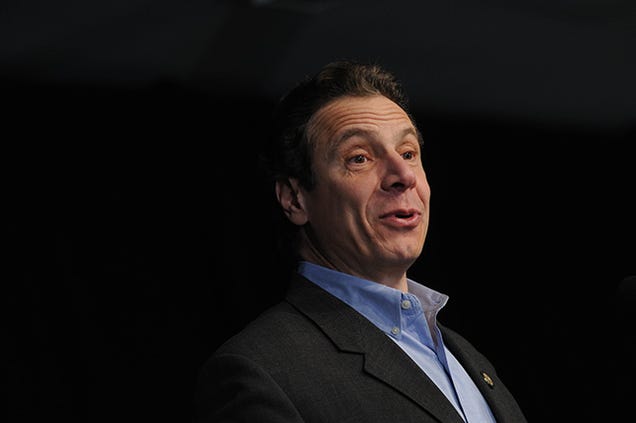![The New Year Is the Oldest Thing: Inside Philadelphia's Mummers Parade]()
The New Year, or South Philadelphia's share of it, was being assembled in a warehouse with a bright yellow Cottman Transmission sign at the entrance, right on the corner of 13th and Reed. "You don't want to get a screw in your foot," Jinks warned me. All around us were the raw materials and detritus of fun: brightly colored vinyl sheeting; racks of satin dresses, fringed costumes, and sequined suit jackets; prickly tinsel; stacks of lumber; buckets of nails, screws, and paint.
Jinks—his full name, mostly unused, is Howard Jenkins—is the head marshal of the Murray Comic Club, which has been part of the city's Mummer's Parade for 79 of the parade's 115 years. There were four days to go, and the space was full of stage setups worked up in secret. A few men were sweeping and organizing props to be loaded into moving trucks. Jinks, gray-haired and dressed in the club's blue and gold colors, pointed out a mock police car with rotating red lights, huge cardboard dice and roulette wheels, a tribute to Robin Williams with a person-sized painted genie one on side and a Captain Hook illustration on the other. He and his team had been in the warehouse every day since Christmas, a campout marked by Sterno cans and two-liter bottles of soda on a foldable table.
"I'm starvin'," Jinks said to one of the club's captains, Dennis Pellegrino. "What are those?"
"Mozzarella balls," Pellegrino said, holding up a quart container of cheese in oil and a Ziploc bag of shredded pork.
"Too much oil," Jinks said, though it came out
Too much erl. "Nah."
"This parade will be my 31st," Jinks said. "I'm a newbie as far as people go. I got taken out of my house by two friends. Well, one was a friend and one was a new guy, captain of a club out in Southwest Philly. They wanted me because I'm mechanically inclined. Within two hours, I had a key to the club; within two weeks I was head marshal. I've been trying to get out since."
![The New Year Is the Oldest Thing: Inside Philadelphia's Mummers Parade]()
|
|
A young Murray Club mummer
|
Despite growing up in Philadelphia, I had never been to a Mummers Parade in person before. The parade for me was a thing on television. Marching up Broad Street, groups of 40 or 50 men wearing sateen clown outfits would strut to music, music that came from either brass bands driven alongside them or from huge speakers carted in U-Haul trucks. These were the comic and wench brigades. When they would arrive at City Hall, they'd perform lampoony skits that addressed current "issues," the quality of actual performance depending on the brigade and the level of investment it had made. A lot of times it just meant drunken strutting, a backward and forward motion requiring a little handheld umbrella as a prop, bobbing up and down above each wily head. Occasionally there would be actual choreography, all done with a beer can in one hand.
The more elaborately costumed brigades—fancies, fancy brigades, and string bands—all brought with them strict movements and over-the-top design to their shows, a few of which ended up with live performances at the Convention Center as detailed and impressive as a Broadway show. Their stages were the pride of Philadelphia, built by electricians, contractors, and other blue-collar workers in their limited free time from their everyday lives.
I'd been born in England, but with family in Philadelphia, and when I moved to the US at age eight, I fell instantly in love with the Americanness of the parade. Here was the home of pancakes for breakfast, throwing a softball around in the backyard, unwavering love for regional sports teams, and the mummers in all their joyful strangeness.
Yet behind the promise of good things to come in the New Year, what the revelry conjured over the years was an ever-receding history. My grandfather, who was raised in a house on Mifflin Street in South Philly, right near the Italian Market, used to play banjo in one of the string bands, though his memory of it is murky and unreliable. It used to be hard to find anybody in or near the city who wasn't affiliated with or connected to a mummer, but that isn't always the case anymore.
"In Southwest Philly, we had 60 comic brigades," Pellegrino said. "Five of the top ten were from Southwest Philly. It was bragging rights. We'd make bets."
The parade has begun to look noticeably smaller, the crowds thinner, the costumes more or less unchanged. There's a cultural atavism that goes beyond the dustiness of the outfits—though blackface routines were banned in 1964, the comic brigades' idea of satire can still be aggressively retrograde, alienating the nonwhite majority of the city's population.
For 2015, the parade was being rerouted and shortened. The number of participants was
down to about 8,000, from 12,000 in 2001. "The people say they support us but they don't come out to see us," Jinks said. The new route—starting at City Hall and marching South on Broad—would only cause a further loss of interest, he feared.
"Shorter parade, less police, less money, less trash cleanup. It's all about money. We haven't had prize money in ten years," one of the club's captains said.
What was at stake, Pellegrino told me, was an entire community that had grown up around the tradition. "It's not the parade," he said. "It's being here, we're like a family. Everybody here has been in everybody's wedding. There's christenings, birthdays; unfortunately, funerals. It's family. It's not just about the one day."
![The New Year Is the Oldest Thing: Inside Philadelphia's Mummers Parade]()
|
|
Members of the Cara Liom N.Y.B.
|
By the time I made it to the garage at 7:30 a.m., in the freezing cold of New Year's morning, the Murray Club had been buzzing for hours. While the rest of the city slept off its headaches, I'd dressed in thermal underwear, two pairs of socks, and two pairs of gloves.
The garage door was open. "Happy New Year, Jinks," I said.
"Well it's not so happy right now," he said, and then his phone rang. He growled into it as I watched a man in workman's boots toiling away at fixing a stalled-out loading ramp on the back of a huge truck. A multicolored train made of light wood and vinyl festooning needed to get up onto the truck, and several of the captains were brainstorming ways to get it there without the ramp. They could all lift together. Or they could wait for the ramp to be fixed. They could utilize a different truck.
In the middle of this, two yellow school buses showed up to pick up the club's parade participants, blocking traffic on the narrow street. Outside, the neighborhood was quiet but for an occasional mummer, walking in full decorative gear and face paint down the empty streets toward one club or heading off toward the parade's beginning. It was like getting to see Disney World before the gates opened.
As Jinks mulled the truck-loading issue, a full brigade of comics started marching backward up Twelfth Street, accompanied by a loud brass band. For a fleeting minute, everyone arranged outside of the garage stared intently in their direction.
Jinks had agreed to station me at his right hand for the day of the parade, which meant riding in his black Dodge sedan while he organized his 2,000 people at the new starting point, down the street from City Hall. In the driver's seat, he looked harried but determined.
"You want a
behgel?" he asked.
"Oh, a
bay-gel. I'm okay, thanks."
![The New Year Is the Oldest Thing: Inside Philadelphia's Mummers Parade]()
|
|
The excitement begins to grow
|
Have you ever seen an action movie where the main boulevard of an entire city is magically blocked off, and the heroes can fight the villains on a street that is free of cars? That's what Broad Street and Market Street in Philly looked like on New Year's Day before 9 a.m. Jinks, happily bullshitting and charming police officers, was given permission to drive up and down, backward and forward, along any area in the vicinity of the parade, as long as he stayed dutifully with the Murray Club. Without notice, he would throw the car in park and jump out to yell at someone or direct a truck toward its proper location.
Every minute, people would lean into his open window and shake his hand, kiss him on the face. By my count, there was not one person in Philadelphia who didn't know Jinks, and he treated everyone with good-ol'-boy decency, throwing in a few jabs and jeers here and there to assert his power. I sat in the passenger seat, a proud companion.
As the brigades set up and congealed, the mummers made final adjustments to their routines, touched up their costumes, added liquor to their drinks. They danced and smiled and said hi to one another. They stopped in Starbucks for coffee where many a mummer stood patiently waiting, attempting to not look nervous or preoccupied while in full costume. A select few comics brigades were undertaking the task of downing an indeterminate amount of alcohol before the 10 o'clock showtime. The sun was coming out; it was a beautiful day in Philadelphia and the one hundred and fifteenth annual Mummers Parade was about to start.
I said goodbye to Jinks and he handed me a ceremonial camouflage walkie-talkie as I got out of the car.
"You can get in touch with me on there, if you need me," he said. "I probably won't be able to hear my phone." I wandered off down Market Street toward the back of City Hall, taking in the very first performers of the day. Camera in one hand and a coffee in the other, I marched toward William Penn with the mummers, capturing their ageless garb on camera and raising my cup to cheers them. By the time a brigade of comics dressed like Yellow Submarine-era Beatles appeared, I was laughing and whooping like an idiot, standing all by myself.
![The New Year Is the Oldest Thing: Inside Philadelphia's Mummers Parade]()
|
|
A glittery member of the Vaudevillains
|
A nearly 20-foot tall mechanical cat was lurching toward City Hall. Wild paws outstretched, it chased angrily after a group of "Internet Spirits," dancing and moving in costumes embellished with computer chips and screen-printed 1s and 0s: a net-neutrality allegory, playing out for a boozed-up holiday crowd in a century-old setting. The giant cat and his feline cronies, who wore suits and fur masks—the Comcats—antagonized and threatened the internet spirits, plugging a plug into a giant outlet that read "ABSOLUTE POWER [WARNING: WILL CORRUPT ABSOLUTELY]."
The performance—one part interpretive dance, another part art show—was the most captivating thing I'd seen all day, a direct attack on behemoth cable corporation that dominates Philadelphia's business and civic life. Comcast built a 974-foot skyscraper that altered the Philly skyline forever in 2008, and in 2014, the cable company had announced that
it was building another one, more than 150 feet taller than the first.
The Comcats performance was put on by a relatively new brigade called the Rabble Rousers, made up of young artists, and it had people in the stands both laughing and looking confused. "People do a lot of things in the Mummers Parade in the name of satire," Jesse Engaard, one of the Rabble Rousers' captains, told me after the parade. "Satire is supposed to be about making power structures change."
That upstart attitude toward satire was lost on the audience watching the Mummers Parade at home. The telecast captured the fancies' abundance of Native American headdresses and glittered turbans—the standard old-fashioned appropriations—and more open displays of backwardness. One man in a wench brigade carried a sign that read "Wench Lives Matter"; another sported an Obama mask and held a placard that read "Illegal Aliens Allowed."
But when the Rabble Rousers appeared, the live broadcast on PHL17 cut away, and stayed away. Footage of it did not appear on the station's online archive of the parade till five days later, well after the other performances had been posted.
Engaard said he was angry about the situation, but that it would only make him recruit harder for the next parade. "I love it so much that I either want to destroy the whole thing or fix it," he said.
"I think the biggest obstacle is convincing the establishment of the Mummers Parade that it has to change and make itself more palatable to Philadelphia in order to survive."
The Rabble Rousers weren't the only thing keeping the parade from feeling like a museum piece. Another brigade, the Vaudevillains, unleashed a performance that felt like something from Burning Man: bright, sparkly jumpsuits and a dance routine with professional finesse. Working on the theme "Mummers in the Stratosphere," they'd dressed up a man like the sun king and sent dancers in tie-dyed rainbow gear to float around him. The sight of the artsier, younger brigades was exhilarating, a vision of a route the parade could take to enter the future after all.
"The parade occupies a weird position," one of the Vaudevillains' captains, Adam Leeds, told me afterward. "On one hand it's a citywide parade, and it's on New Year's Day, which is an important day, but on the other hand, it's also the parade of a specific set of neighborhoods and a specific set of ethnicities in South Philly, and those neighborhoods are continually changing. It needs to change. It needs to include more kinds of Philadelphians."
Or the parade needs to notice the people it already includes: Alongside the comic brigades rolled huge flatbed trucks carrying the brass bands. The band members didn't wear costumes, but were dressed in heavy layers, scarves, and hats like the crowd, their instruments crushed together in a shining array of sousaphones, trombones, trumpets, and more. The bands are made up almost entirely of Philadelphia's black musicians; they see themselves as hired session players, and that's how the brigades regard them. The brass bands do not call themselves mummers.
One group of horn musicians in particular spent all day tirelessly bumping out Macklemore hits in between a certain Meghan Trainor song, keeping the crowd animated and energized. I watched them play, awestruck, as they were hauled slowly in a truck caged in by black bars, leading the charge of a group of mummers.
![The New Year Is the Oldest Thing: Inside Philadelphia's Mummers Parade]()
|
|
One of the parade's many brass bands on Two Street
|
The march down Broad Street was one long party. I ate a three-dollar salted soft pretzel from a cart; I met up with friends. I found my uncle and cousin dressed as Smurfs in the Cara Liom Wench Brigade and took pictures with them. My cousin is 13 and was tired of being a mummer; he looked surly and bored even dressed as a jubilant cartoon character in bright blue face paint. The sun was shining and all my layers were making arm movement almost impossible. Every so often I would get a call from Jinks and we would yell our individual locations to each other over the phone, in the hopes of crossing paths. At one point, he picked me up in his car on Pine Street and we chatted for thirty seconds before I got back out and marched south again.
At the end of the day, the journey culminated in an even bigger party. After all the brigades had been duly judged, many of them ended up at Washington Ave and South 2nd Street, or "Two Street" as it's locally called. The brass bands and their accompanying comics brigades, as well as the amazingly on-point and put-together string bands, performed a condensed replay of the festivities down Two Street. It was drunker, louder, and more fun.
Between performances, one very intoxicated woman attempted an Eagles chant:
"E . . . A . . ." She did it so slowly that she forgot to continue, and a group of her friends around her laughed. All of South Philly was out in the street and barely 15 seconds passed without well-wishers offering a Happy New Year to strangers.
![The New Year Is the Oldest Thing: Inside Philadelphia's Mummers Parade]()
|
|
An alien-themed string band
|
Amid the music and the dancing and the beer and the neighbors and the running around on Two Street, pride overcame ambivalence about the tradition. A mummer in Smurf gear came up to me as I marched with a friend and proclaimed, "Oh my God, I've found you. My wife." Then he disappeared. Two neighborhood residents insisted I take a Jello shot, open-faced in a takeout condiment container, a nuclear orange color. I never take Jello shots from strangers. I danced with a mummer friend whose face was obscured by a giant fabric heart and decided, after all, to take the shot. The chilled citrus alcohol mixture burned slightly as it went down.
[Photos by Dayna Evans]






























